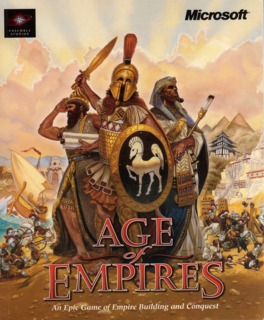A good game despite its flaws........
You typically start each game with a town center, a few peasants, and stone age technology. Your first priorities are building shelter and, like the good hunter/gatherer that you are, hunting and gathering food. With food and shelter, you are free to create more peasants who in turn can be sent out to chop wood, quarry stone, or mine gold. Eventually, you build more complex structures and are able to increase your technological level. Oddly, to raise your technology level, you do not assign peasants to be scientists or scribes, but instead you spend food. I have never known of a situation where food buys technological progress, perhaps the scientists won't work unless you throw a banquet.
Increased technology allows you to construct more advanced units, of which there are many. There are a total of 40 units, which is actually a great amount of detail for a historical period which ends before the renaissance. There are 7 different types of archers, 9 types of infantry, and 11 types of boats. All in all, the many types of units allows Age of Empires to very closely model the types of armies in use 2000 years ago. Age of Empires has 12 ancient civilizations available to the player. Each civilization has certain units not available, however they gain certain bonuses for whatever aspect that civilization excelled at. For example, the Greeks can produce advanced infantry more quickly, while the Persians are excellent hunters. Microsoft obviously did its research here, and the result is a well rounded, historically accurate product (at least for a game).
The resource model of Age of Empires wins both praise and condemnation from me. Scattered across the board are many different types of resources, including berry bushes, forests, quarries, mines, wild game, and fish stocks. It is nice to see mankind's interaction with nature when gathering resources instead of the simple 'ore harvester' or whatever. You can watch your little people pick berries, cut down trees, mine gold, and hunt and butcher wild animals. One problem I have with the resources is the lack of the bounty of nature. A typical game might last 10,000 'years' and in all that time, animals do not reproduce, and berries and forests do not regrow. This basically means that you are stuck with the amount of resources that the map comes with, leaving you with no incentive to conserve for the future generations. If you started with 10 gazelles, you will never get any new ones, you will only lose them from hunting and predation from lions. (I must admit, it's pretty neat to see a lion eat a gazelle in a computer game)
Another problem with the resource model is the handling of food. No, I'm not talking about dangers from undercooked meat, I'm talking about the food supply. It takes food to create villagers and soldiers. I have no problem with that. I fail to see why it takes 30 villagers-worth of food to upgrade a catapult trireme to a juggernaut. Also, villagers don't eat. Your populace can stand around for thousands of years and never need a bite. This causes a problem with siege tactics. The tired and true strategy of destroying farms to kill of the population just doesn't work. Also, the units most useful when under siege, such as the catapult, require no food to create.
Despite its flaws, Age of Empires is great fun to play. The graphics and sound effects are of high quality, and the computer plays a respectable game. In fact, there is a very large selection of AIs to choose from in the scenario editor. Ah... the scenario editor. The scenario editor allows you total control in the design of scenarios and campaigns, right down to the intro movies. Even if you don't like the full selection of scenarios included with the game you have all the tool at your disposal to create a scenario exactly to your liking. Its minor annoyances are just that, minor compared to the game as a whole. For any fan of real-time strategy or historical simulations, I would recommend Age of Empires.

